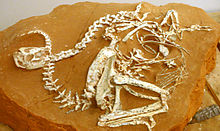Khaan
|
Khaan Temporal range: Late Cretaceous, 84–75 Ma |
|
|---|---|
 |
|
| Holotype IGM 100/1127 | |
| Scientific classification | |
| Kingdom: | Animalia |
| Phylum: | Chordata |
| Class: | Reptilia |
| Clade: | Dinosauria |
| Order: | Saurischia |
| Suborder: | Theropoda |
| Family: | †Oviraptoridae |
| Genus: |
†Khaan Clark, Norell & Barsbold, 2001 |
| Species: | †K. mckennai |
| Binomial name | |
|
Khaan mckennai Clark, Norell, & Barsbold, 2001 |
|
Khaan (/ˈkɑːn/; Mongol [χaːŋ] 'lord') was an oviraptorid dinosaur that was found in the Djadochta Formation of Mongolia and lived in the Late Cretaceous Period (Campanian), 75 million years ago.
Khaan did not differ much from other oviraptorids. At first, its remains were assigned to "Ingenia", but the Khaan manual structure, lacking the expansion of the upper third metacarpal, was considered to differ sufficiently from that of "Ingenia" for it to be assigned to its own genus.
The oviraptorid diet is disputed, with plants and molluscs having been suggested. Like other oviraptorids, Khaan was probably at least partially a meat eater, feeding on small vertebrates like mammals, lizards and possibly other small dinosaurs. It was also probably feathered.
The type species Khaan mckennai was in 2001 named by James M. Clark e.a. The genus name is derived from Mongol khaan, "lord" or "ruler". The specific name honours the paleontologist Malcolm Carnegie McKenna.
...
Wikipedia
